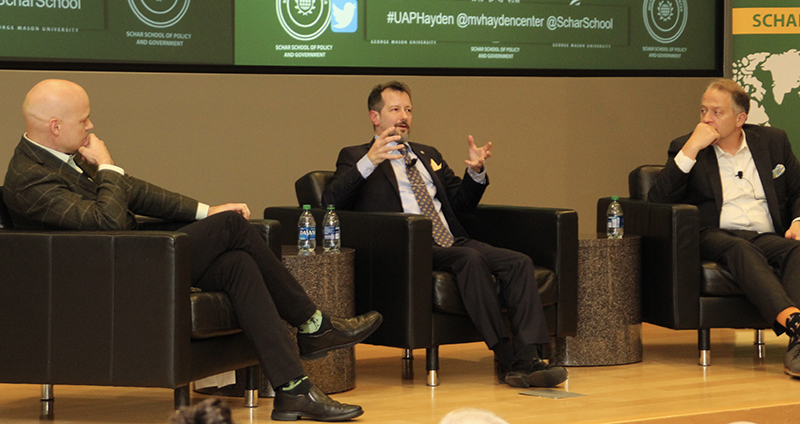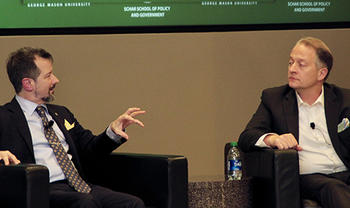

If you were one of the 100 who attended in person or joined the 4,447 others watching the livestream of Wednesday night’s panel discussion about U.S. intelligence and unidentified anomalous phenomena—UAP, formerly UFO—expecting to hear about recovered saucer crashes, alien bodies, abductions, cattle mutilations, crop circles, and archived photo and film evidence of extraterrestrial entities, you were sorely disappointed.
Which is not to say the 90-minute conversation hosted by the Schar School of Policy and Government’s Michael V. Hayden Center for Intelligence, Policy, and National Security at George Mason University’s Mason Square was not engaging and (somewhat) enlightening.
Moderator David Priess, a former CIA officer, did his best to elicit newsmaking responses from Sean Kirkpatrick, the career intelligence official who is the outgoing head of the Pentagon’s All-Domain Anomaly Resolution Office (AARO) and who has been leading the official investigation into UAPs and related activities for a year. But startling revelations were few, with the bottom line, said Kirkpatrick, “90 percent of what we investigate turn out to be balloons.”
When Priess asked him what his personal hunch about UAPs is after all the scientific evidence and data he’s been privy to in the last year, Kirkpatrick dissembled. “It’s not what I believe,” he said, “it’s about what I can prove.” And that, he added, was that there is no evidence of anything extraterritorial occurring.
Washington Post intelligence and national security reporter Shane Harris, who admitted to a long fascination on the subject, offered his own insight as to how news coverage and the availability of information of UAPs has changed now that the public sees the government taking the phenomenon seriously enough to devote significant resources to it. And new law protecting whistleblower witnesses who provide information the government may not want divulged seems to be working, he said.
“It’s a whole new kind of coverage,” Harris said. “It’s not ‘if’ anymore, it’s ‘what is it?’ It’s a subject we all clearly find fascinating.”
Which is true for one Schar School student who was in attendance. Griffin Crouch, a government and international politics (GVIP) freshman from Arlington, Virginia, said he found the discussion beneficial.
“It’s a fun topic, but a very serious analysis,” he said. For him, “it opened a window on how we look at these incidents.”
See the replay on the Hayden Center YouTube channel.
